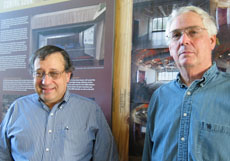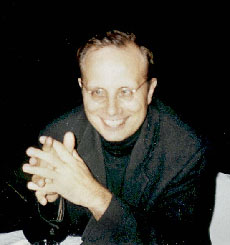|
Mon., November 27
2:30 p.m. Particle Astrophysics Seminar - Curia II
Speaker: G. S. Blondin, Harvard University
Title: Determining the Type, Redshift, and Phase of a
Supernova Spectrum
3:30 p.m. DIRECTOR'S COFFEE BREAK - 2nd Flr X-Over
4:00 p.m. All Experimenters' Meeting - Curia II
Tue., November 28
2:00 - 4:30 Special Retirement Symposium for Ken Stanfield - 1 West
Title: Stanfield: The Career
THERE WILL BE NO DIRECTOR'S COFFEE BREAK TODAY
THERE WILL BE NO ACCELERATOR PHYSICS AND TECHNOLOGY
SEMINAR TODAY
Click here for NALCAL, a weekly calendar with links to additional information. |
Monday, November 27
-Potato Au Gratin
-Monte Cristo
-Savory Roasted Chicken Quarters
-Lasagna Bolognaise
-Chicken Ranch Wrapper
-Assorted Slice Pizza
-Szechwan Style Pork Lo Mein
Wilson Hall Cafe Menu |
|
Wednesday, November 29
Lunch
Southwestern Cornish Hens
Sautéed Corn, Beans & Peppers
Butternut Squash
Cornmeal Cake
Thursday, November 23
Dinner
French Onion Soup
Filet Mignon w/Espagnole Sauce
Potato Gratin
Vegetable of the Season
Brandy Flan
Chez Leon Menu
Call x4598 to make your reservation. |
|
|
Butler to head the US-CMS Research Program

Joel Butler (left) will take over for Dan Green as head of the US-CMS Research Program.
On January 1, Joel Butler will replace Dan Green as head of the US-CMS Research Program. Butler has held a number of positions at Fermilab--from working on fixed-target experiments and beams to serving as head of the Computing Division. Most recently, he's been working on CMS's forward pixel tracker: a detector that will hug the LHC beam pipe and track particles out to a radius of 20 cm. "I've been focusing on this little part of CMS for two years," said Butler, "but now my job has a much bigger scope. I need to make sure all the different US efforts come together and orient ourselves to the new task ahead."
The new task is calibrating and commissioning CMS. Green--who has headed the US-CMS Detector Construction Project and Research Program for 12 years and will still play an active role--says these next steps require the perfect balance of restraint and enthusiasm. "You have to be open to new ideas, but you also have to have a tremendous scope of organization," he said. Like tuning an instrument, it is important that CMS measures parts of the Standard Model that are already understood before new discoveries can be made.
Once CMS is tuned and taking data, US-CMS will help keep the detector calibrated, provide maintenance, plan new upgrades and perform data analysis. As a "Tier 1" institution, Fermilab will also receive, process and distribute CMS data to about 2,000 other researchers worldwide. "The idea is that extracting the physics will be challenging, and it will take the efforts of physicists from a number of countries to do the analysis," said Butler. "People from all over the world can grab the data from us without a lot of overhead." With experience from the Tevatron, and with an LHC Physics Center stationed in Wilson Hall, Fermilab physicists will be able to deal with problems, provide tutorials, and mentor CMS researchers from all over the world.
"We want to be fast, we want to be accurate, and we don't want to stifle anyone's creativity," said Butler. "We want to keep the throttle open just enough," added Green.
--Siri Steiner
|
Bauerdick heads CMS Center
To provide more focus on CMS efforts, Fermilab has created a CMS Center. The center--which will include all CMS experimenters at Fermilab--will be headed by Lothar Bauerdick,
 |
| Lothar Bauerdick
|
who currently is CMS Computing Coordinator. "We have Fermilab people from a number of divisions and sections, and the CMS Center will give us an overall structure to work on CMS together," said Bauerdick.
Bauerdick's role will be different from that of Joel Butler, head of US-CMS; while Butler is heading all US efforts with Fermilab as the hub, Bauerdick will organize all CMS efforts at the lab. Bauerdick says he will work to manage, integrate and communicate Fermilab's CMS efforts and to make CMS more visible at the lab. "We should be communicating about what we are doing and how we are doing it," said Bauerdick.
Bauerdick came to Fermilab from DESY six years ago, and has led the US software and computing project to build the Tier-1 center and to develop the software to manage and analyze CMS data. "Fermilab plays such an important role for building and commissioning CMS," he said, "I look forward to the CMS center helping us to get ready for extracting the physics."
--Siri Steiner |
The Courier News,
November 22, 2006:
Fermi asks public its views on collider
BATAVIA -- The next step in the evolution of particle physics could be coming to Fermi National Accelerator Laboratory in the near future -- and officials there want to know what you think about it.
Fermilab is one of four sites in contention to host the International Linear Collider, a 20-mile-long particle accelerator that is hoped will bring scientists to the next level in their understanding of the universe.
Read More |
|
|
How slippery is it?

The aspect of winter weather that has the greatest impact on Fermilab's accident rates is reduced traction. Despite our aggressive snow and ice removal program, a day with falling snow usually means one or two people showing up in the Medical Department with slip injuries. Most are minor, but fractures and dislocations sometimes occur. Onsite vehicle accidents are affected as well. Usually, a vehicle goes through a turn too quickly and slides off the road. Consequences are typically minor, though we do have an occasional roll-over.
Because the Lab has such a large outdoor surface available for walking, it's difficult to keep everything clean and dry. Walkers can help out by observing conditions, taking smaller flat-footed steps, wearing appropriate footwear, and holding onto railings or other immobile objects. If there is a bucket of salt near an entrance, please help and toss some out.
Two common locations where vehicles slide off the road are outbound Pine Street (between A Road and the Science Center) and the Swenson Road curve near the pond at DZero. However, any turn on slick pavement can be hazardous. Reduce your speed, drive smoothly, and allow longer braking distances. If you begin to slide, gently let off the accelerator and turn in the direction you want to go. Finally, don't let all-wheel drive give you a false sense of security; it offers no advantage on ice.
Safety Tip of the Week Archive
|
Server downtimes
The Computing Division expects IMAP servers to be unavailable on on Thursday, November 30, 2006 between 6am and 7am. Servers will be down for about 10-20 minutes while security patches are installed. This will interrupt both IMAP and webmail access.
NALWO Holiday Trip
NALWO is organizing a holiday trip to Chicago on
Saturday, December 9.
Enjoy shopping, music and entertainment at Chicago's largest open-air holiday festival, the German-American "Christkindlmarket" at Daley Plaza--or try skating on the ice rink at Millennium Park, which is free and open to the public.
The bus will be leaving from the Lederman Science Center at 10:00 a.m. and we will return by 4:30 p.m. There is no charge for the bus.
To register or for further information please contact:
Selitha Raja at (630) 305-7769 or selithar@hotmail.com
Attention scientists, engineers and designers
Fermilab is preparing to transition to a new and modern CAD data management tool that will allow engineers, designers, and scientists to work in an integrated engineering environment.
Personnel who currently use I-DEAS must participate in a one-day training course designed to ease the transition. All mechanical CAD users are encouraged to enroll as well. There are 11 days reserved for this training and you can sign up via the Fermilab
TRAIN system.
English Country Dancing
English country dancing will continue at Kuhn Barn, but now meets the first Sunday afternoon of the month. The next session will be Sunday, December 3, at 2 p.m. Newcomers are always welcome. Please contact folkdance@fnal.gov or call 630-584-0825 or 630-840-8194.
Upcoming Activities |
|